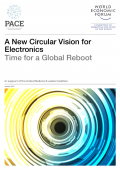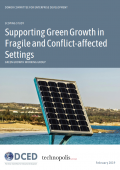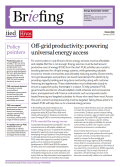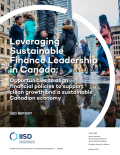
E-waste is now the fastest-growing waste stream in the world, and society only deals with 20% of e-waste appropriately, yet e-waste is worth at least $62.5 billion annually. This paper discusses the state of play regarding global e-waste handling and production, and the potential benefits of the proper treatment of e-waste, including resource recovery from urban mining, reverse logistics and advanced recycling and recapturing.

This scoping paper explores how inclusive and green growth can be supported in fragile and conflict-affected settings (FCAS), and if there are certain approaches and instruments to support green growth, which are more or less adapted for such settings. It includes case studies on waste management in Sierra Leone, the the “Post Conflict Window” of the African Enterprise Challenge Fund (AECF), and the Deutsche Gesellschaft für Internationale Zusammenarbeit GmbH /German Corporation for International Cooperation (GIZ) & IDH Sustainable Trade Initiative: Regional Landscape Approach in Côte d’Ivoire.

This policy brief, Off-grid productivity: powering universal energy access, outlines how mainstreaming productive uses of energy (PUE) can drive economic development, boost demand for energy, and support governments' sustainable development plans based upon evidence and experiences from the Energy Change Lab, a programme led by IIED and Hivos that works closely with partners in Tanzania on productive uses of energy (PUE) for community entrepreneurs.

In advance of Canada’s Expert Panel on Sustainable Finance releasing their recommendations on the best finance and investment structures for climate action, Leveraging Sustainable Finance Leadership in Canada sets out a three-year policy roadmap to funnel private investment into a sustainable Canadian economy.
Laws, alongside the institutions and legal systems that ensure their implementation and enforcement, are an essential component of an enabling environment for green growth. Environmental Rule of Law: An analysis of data availability aims to provide a comprehensive review of currently available datasets allowing for the measurement of environmental rule of law, using the OECD Pressure-State-Response model to determine suitable enforcement and compliance indicators.
